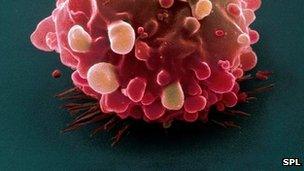Male bowel cancer on the increase, says Cancer Research UK
- Published

Bowel cancer is the second most common cause of cancer death in the UK after lung cancer
Bowel cancer rates among men have increased by more than a quarter in the last 35 years, a report has suggested.
The Cancer Research UK study said this contrasted with a rise of just 6% in the rate for women over the same time.
However, bowel cancer survival rates are improving with half of all patients living for at least 10 years after being diagnosed.
It is not known why there should be such a large difference in the increase in rates between men and women.
Rising rates of bowel cancer may be linked to obesity and diets high in red and processed meat and low in fibre, as well as the increasing age of the population.
The disease is the second most common cause of cancer death in the UK after lung cancer.
Cases of bowel cancer for men have increased from 45 per 100,000 in 1975-77 to 58 per 100,000 in 2008-10, a rise of 29%.
The figures for women were 35 per 100,000 rising to 37 per 100,000 in the same timescale.
The age group with the biggest rise is those in their 60s and 70s, who experience 23,000 new cases a year.
'Starring role'
Professor Matthew Seymour, of Leeds University, who is director of the National Cancer Research Network, said: "We know the risk of bowel cancer increases as we get older and, since we're all living longer, it's no surprise to see that the number of people getting the disease is rising.
"But when we look at these figures and take people's age into account, we still see that the risk of bowel cancer has gone up in men in the last 35 years.
"It's important to find out what's behind the rise and what we can do about it.
The figures are released to mark bowel cancer awareness month and the launch of a new campaign by the Bobby Moore Fund charity.
The wife of footballer Bobby Moore says people "must not die of embarrassment"
The Make Bobby Proud campaign aims to spread the word about the disease, especially among men involved in the football community.
Stephanie Moore, whose footballer husband Bobby Moore died of bowel cancer in 1993, said it was encouraging that bowel cancer survival rates were improving.
But she added: "However, it's vital we continue to fund research to fight this disease as these new statistics show."
Dr Julie Sharp, senior science information manager at Cancer Research UK, said the charity's researchers had played a "starring role" in the diagnosis and treatment of the disease.
- Published7 March 2013
- Published5 March 2013
- Published2 March 2013
- Published28 February 2013
- Published24 December 2012
- Published19 December 2012